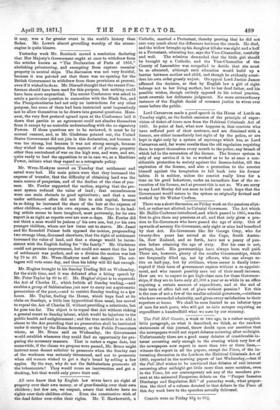Mr. Wren-Hoskyns moved on Tuesday that settlement and entail were
bad. His main points were that they- increased the expense of transfer, that the difficulty of obtaining land was the main source of pauperism, and of the decline of the class of yeo- men. Mr. Fowler supported the motion, arguing that the pre- sent system reduced the value of land ; that encumbrances were one main obstacle to good agriculture ; and that a man under settlement often did not like to sink capital, because in so doing he increased the share of the heir at the expense of other children,—not at his own expense, as the Times in its lead- ing article seems to have imagined, most perversely, for its own report is as right as reports ever are now-a-days. Mr. Fowler did not think a man would be jealous of his own son, but for his own younger children, whom our law turns out to starve. Mr. Jesse' and Sir Roundell Palmer both opposed the motion, propounding two strange ideas, discussed elsewhere, that the right of settlement increased the value of land, and that a change would be incon- sistent with the English feeling for "the family." Mr. Gladstone could not promise improvement, but could not assert that the law of settlement was perfect, and on a division the motion was lost by 79 to 49. Mr. Wren-Hoskyns need not despair. The cot- tagers will vote some day, and then his lobby will fill fast enough.


































 Previous page
Previous page